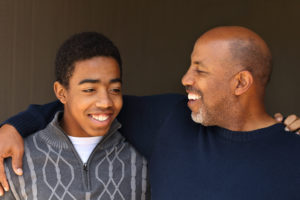Top 2 Parenting Tips When Your Kids Have ADHD!

It’s ADHD Awareness Month!!
When your kids have ADHD, you often find yourself wondering, "What next?"
Maybe it’s all new, and you're trying to figure out where to start. Or maybe you've been dealing with this for quite some time. Either way, there is a veritable cornucopia of treatment options available for your child and your family, and it can be really overwhelming.
Two Tips For Success
But no matter what you choose to do, when your kids have ADHD, these 2 key pieces of parenting knowledge will have the biggest impact on your child’s (and your!) success:
1. Developmentally, your child with ADHD is 3-5 years behind his or her same age peer
Yes, you heard me. That means that your 11-year old will behave like an 8 or 9-year old sometimes (but not all the time, which can get really confusing). Please hear this. This is not an intellectual delay! Our kids are typically incredibly smart. But in terms of working memory, impulse control, emotional regulation and executive functions skills, the odds are they are significantly (and inconsistently) behind their same age peers in some aspects of their development.
Why it Matters:
It’s much easier for you as a parent to approach your child with realistic expectations when you remember that your 15-year old high school sophomore may only have 6th grade level working memory. You can continue to provide support without guilt that she or he is ‘too old’ for that. This prevents you from punishing your child for a developmental delay.
Article continues below...
Treatment for your Child's ADHD
Download a free tip sheet "Recommended Treatment for ADHD: Medication & Behavior Management" for what's really recommended for your child or teen.
What you can do to help:
Let’s do the time warp again! Spend some time in a classroom 3-5 years behind the child's current grade (this exercise is particularly great for teachers!) to remind yourself what ARE reasonable expectations for that stage of development.
Fun Fact: The things that help kids with ADHD in a classroom actually benefit all kids!
2. Adopt a special needs or disability perspective.
This is a tough one for most parents – for many reasons. ADHD is an invisible disorder. Since a child doesn’t ‘look’ disabled, many parents have a hard time seeing that their child has some special needs or may require additional supports. Some also feel saying their child with ADHD is ‘disabled’ is insulting to other kids/parents with ‘real’ disabilities and challenges. But here’s the thing: the moment you’re able to see that your child isn’t failing science because he ‘won’t’ do the work, but because he is really struggling, that’s the moment you’ll be able to approach your son with greater understanding and empathy.
Why it Matters:
ADHD rarely travels solo. At least 80% of kids with ADHD also have a co-existing condition like a learning disability. They often qualify for an IEP or 504 Plan under IDEA (Individuals with Disabilities Education Act). These accommodations are critical for helping kids with ADHD (and other challenges) achieve success in school. Your child is eligible for those protections because she or he does have special needs, even though they are invisible.
What you can do to Help:
The ‘wheelchair’ analogy may be over-used, but it can help parents adopt this perspective because it makes so much sense. You would never demand that a child in a wheelchair get up and walk up the stairs in his middle school. There’s a ramp right next to the staircase and an elevator right next to the ramp. It’s not a matter of ‘won’t.’ This child CANNOT walk up the stairs. But this child CAN use an alternate method and successfully arrive at the library on the second floor.
Fun Fact: Many kids need alternate methods to be successful. The sooner we recognize and accept that, the better advocates we will be for all kids.
Change Starts With You
These are the 2 key attitude shifts that meant the most to me as a parent, and have been the most impactful for many of the parents I work with.
When your kids have ADHD, chances are you spend a lot of time searching for answers to help them be as successful as you know they can be. You’re looking around, doing the best you can to find the answers that work best for your family.
The best, easiest and most effective answers usually start with you! And your child is incredibly lucky to have you as a caring, concerned parent.
Worry not. Help is here!
The Secret’s Out: Complex Kids do NOT have to be such a challenge anymore!
Join us as we reveal proven methods for turning chaos into calm.

